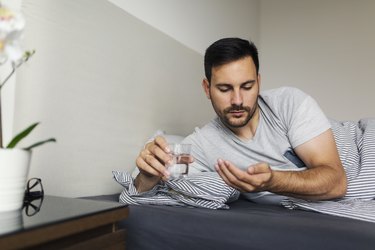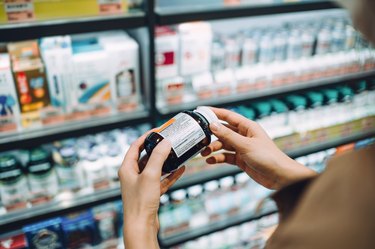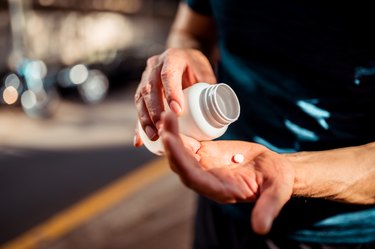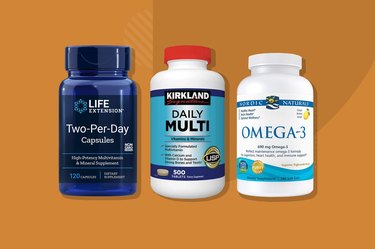
Weighted blankets. Smart mattresses. Aromatherapy eye masks. In our quest for a good night's sleep — which still eludes about 1 in 3 people in the U.S., per the Centers for Disease Control and Prevention — many of us will try just about anything.
While about 4 percent of people in the U.S. turn to prescription sleep aids, many others prefer to use natural sleep aids. But "natural" doesn't always mean "necessary" or even "effective."
Video of the Day
"As a general rule, no one should need a sleep supplement," says Michael Breus, PhD, a clinical psychologist and sleep specialist. "Everyone should be able to sleep on their own."
In fact, regularly popping a sleep supplement may be masking a bigger problem, like chronic insomnia.
That said, there are exceptions to the rule, he says, including people who may be deficient in a certain nutrient, like vitamin D, or hormone, like melatonin. "The first thing I do [with my patients] is do blood work and find out if they have enough nutrients," he says. Then, we "fix what's missing."
"Supplementation is only needed if we see a deficiency," he explains.
If it turns out you are deficient in a particular nutrient, work with your doctor to shore up your diet or ask if you're a candidate for a supplement. (Always talk to your doctor before taking a sleep aid — even a natural or over-the-counter one — because they can cause side effects or interact with other medications.)
Here, we sort out the science from the hype about eight natural sleep aids.
Tip
The most effective natural sleep aid is practicing good sleep hygiene, including going to bed and waking up at the same time every day; keeping your bedroom cool, dark and quiet; limiting screen time, alcohol and caffeine before bed; and getting regular exercise during the day.
1. Melatonin
Melatonin is a hormone that helps regulate the sleep cycle. During daylight hours, our levels of melatonin decrease; when we're exposed to darkness, our levels increase.
Taking melatonin has been shown to reduce the amount of time it takes to fall asleep, according to the Mayo Clinic, and may be more beneficial for older adults who are lacking in the hormone.
Other people who might benefit from occasionally taking melatonin supplements include those who do shift work, Breus says. A November 2020 study in Sleep Medicine found shift work leads to a decrease in melatonin levels.
Melatonin may also help people who are jet lagged, Breus says, although he points out that it's not necessary to take it every time you hop on a plane. After a few days in a new time zone, your body will naturally adjust to local time, he says.
Although melatonin is among the most popular natural sleep aids and generally considered safe, you should still use caution when taking it.
"People think melatonin is a sleeping pill, and it's not," Breus says.
Some of the side effects of melatonin include headaches, dizziness and drowsiness, and melatonin supplements can interfere with diabetes medications and birth control, among other drugs, according to the Mayo Clinic.
Melatonin Supplements We Like
1. Herbatonin 0.3 mg Plant Melatonin: Amazon ($17.99 for 90 capsules)
Breus says he's impressed with the quality of the ingredients in this plant-based melatonin supplement.
2. Nature Made Melatonin: Amazon or Target ($9.29 for 240 tablets)
Nature Made is a popular supplement option — the company does “a good job in the quality of materials they put into their supplements,” Breus says. The supplement is also USP certified.
2. Valerian Root
Native to Europe and Asia, the valerian plant has been used in traditional medicine since Greek and Roman times. Today, it's thought the root of the valerian plant may help people sleep better.
A 2020 review in the Journal of Evidence-Based Integrative Medicine found the herb valerian could help people sleep better and feel less anxious. Valerian is thought to work by boosting the levels of GABA, a neurotransmitter (or chemical messenger) in the brain that plays a role in relaxation and sleep.
Valerian may also increase the perception of sleep quality in people with insomnia, according to an older June 2010 meta-analysis in Sleep Medicine.
Not all studies have shown valerian root to be an effective sleep aid, though, and there are some risks to keep in mind. Notably, the supplement's side effects might include headache, dizziness, stomach issues or even sleeplessness, according to the Mayo Clinic.
Valerian may also interact or interfere with other medications, including depressants like benzodiazepines and narcotics. And it's not clear from research what dosage is most effective.
Valerian Root Supplements We Like
1. Nature’s Way Valerian Root Capsules: Amazon ($10.79 for 100 capsules)
The root of the valerian plant has shown the most promise for sleep. This supplement, by Nature’s Way, contains 100 capsules of 530 mg.
2. GNC Herbal Plus Valerian Root Extract: GNC.com or Amazon ($19.99 for 50 capsules)
This supplement was a top pick in the Consumer Lab review of valerian supplements. Testing found that GNC Herbal Plus contained good quality ingredients and the 4 to 8 mg of valerian root that was specified on the label. Each capsule has 500 mg of valerian root extract.
3. Magnesium
Magnesium is a mineral found in many foods, including green leafy vegetables, fortified breakfast cereals and nuts and seeds. Our bodies need magnesium to produce energy as well as to regulate our blood pressure and blood sugar levels, according to the National Institutes of Health (NIH).
Adults assigned male at birth (AMAB) need about 400 to 420 milligrams of magnesium per day, whereas adults assigned female at birth (AFAB) need about 310 to 360 milligrams. But despite its presence in a wide variety of foods, some surveys show nearly half of all Americans aren't consuming enough magnesium.
Some people are also more likely to be running low on magnesium than others; this includes people who have GI disorders, like Crohn's or celiac disease, as well as those with type 2 diabetes, per the NIH.
The problem is, low magnesium levels may interfere with our ability to sleep well. In people AFAB, low intakes of magnesium have been linked to shorter sleep, according to an October 2019 analysis in Nutrients.
It's thought magnesium helps increase the body's levels of GABA. And some research, including a May 2017 systematic review in Nutrients, suggests magnesium can help ease anxiety — and anxiety alone can keep us awake at night.
If you're running low on magnesium, consuming more of the nutrient might help you sleep better. A December 2012 study in the Journal of Research in Medical Sciences found when older adults who had insomnia took 500 milligrams of magnesium daily for eight weeks, they slept better than those who didn't take the magnesium supplements.
Keep in mind, though, that taking too much magnesium in supplement form can can nausea, abdominal cramping and diarrhea, and it can also interfere with antibiotics, according to the Mayo Clinic.
Magnesium Supplements We Like
1. Nature Made High Absorption Magnesium Glycinate: Amazon ($68.97 for 180 capsules); Target ($15.79 for 60 capsules)
There are many different forms of magnesium, but magnesium glycinate is particularly promising for promoting sleep, Breus says.
2. MagSoothe: JigsawHealth.com ($7 for 7 packets); Amazon ($44.97 for 60 servings)
Breus recommends MagSoothe, a packet that contains magnesium lysinate glycinate chelate. Mix each packet with 4 ounces of water.
4. Vitamin D
Vitamin D is most known for its role in maintaining healthy bones. The vitamin helps your body absorb calcium, and together, the two nutrients help protect against osteoporosis. But running low on D may also hinder your ability to get a good night's sleep.
One October 2018 review and meta-analysis in Nutrients found people who were deficient in vitamin D were more likely to have sleep disorders than those who weren't too low on D. The research also found that the less vitamin D people had, the more likely it became they weren't getting enough sleep.
Other research, including a July 2017 study in PLOS One, has found a link between vitamin D deficiency and a risk of sleep apnea, a condition in which you stop breathing temporarily in your sleep.
Taking a vitamin D supplement has been shown to improve sleep quality, according to a May 2022 review and meta-analysis in Nutrition and Health.
Vitamin D can be hard to find in foods that haven't been fortified with it (fortified foods include certain milks and breakfast cereals). Rather, D is made when your skin is exposed to the sun — hence its nickname, "the sunshine vitamin."
About 1 in 4 people in the U.S. are thought to have too-low levels of it, according to the NIH. Adults ages 18 to 70 need about 15 micrograms (or 600 IUs) of D each day.
Excessive amounts of vitamin D can cause hypercalcemia, which can cause nausea, vomiting and kidney stones, among other complications, according to the NIH. Vitamin D supplements can also interact with medications, including statins and steroids.
Vitamin D Supplements We Like
1. Source Naturals Vitamin D3 Liquid Drops: Amazon ($14.69 for 695 servings); Walmart ($10.98 for 369 servings)
These liquid vitamin D drops were a top pick from Consumer Lab. This one contains D3—the same form found in fortified foods—and is better form for sleep than vitamin D2.
2. Nature Wise Vitamin D3 1,000 Subscription: NatureWise.com ($13.99 for 360 softgels)
Nature Wise’s supplement contains a reasonable dose of 1,000 IUs (the upper limit for D is 4,000 IUs for adults). And, because vitamin D is a fat-soluble vitamin, the supplement also contains organic extra virgin olive oil to boost its absorption.
5. Vitamin C
A vitamin C deficiency can cause more than just scurvy — it may also interfere with your sleep. Some research has shown a link between too little C and short sleep: A May 2013 study in Appetite, for example, found people who only logged five to six hours a night were also more likely to be running low in vitamin C than people who slept for seven to eight hours.
Vitamin C is an antioxidant — and people who sleep too little also tend to be running low in other antioxidants, according to December 2020 research in Nutrients. Antioxidants help combat free radicals, which are harmful molecules that can cause oxidative stress. Oxidative stress, in turn, has been linked to sleep disorders, according to the Nutrients study.
Vitamin C helps the body produce norepinephrine, a neurotransmitter that helps regulate your mood and plays a role in the production of serotonin (too-low levels of serotonin can contribute to depression), according to the study.
The bottom line: While there does seem to be a connection between vitamin C and sleep, we can't say for sure whether taking vitamin C will help you get better zzzs based on the research done so far.
People AFAB need 75 milligrams of vitamin C each day, while people AMAB need 90 milligrams. Most people in the U.S. get enough vitamin C in their diets, per the NIH, although many also report taking it in supplement form. You can find the vitamin in fruits and vegetables, particularly citruses like oranges and grapefruit.
Vitamin C Supplements We Like
1. Garden of Life Raw Vitamin C Capsules: GardenofLife.com ($16.79 for 60 capsules); Amazon ($25.19 for 120 capsules)
This vitamin C supplement is made from a blend of organic fruits and vegetables. It also contains a reasonable 500 mg dose (the upper limit for adults is 2,000 mg), as many people already get enough C from their diets.
2. Nature Made Vitamin C: Amazon ($14.99 for 200 gummies); Walmart ($7.88 for 120 gummies)
Tired of swallowing capsules? This gummy supplement contains 250 mg of vitamin C. It was also an approved pick from Consumer Lab in its review of vitamin C supplements, which was last updated in May of 2022.
6. Ashwagandha
Ashwagandha — also known as winter cherry or Indian ginseng — is an herb long used in traditional Indian medicine to reduce anxiety. These stress-easing benefits of ashwagandha may also help people sleep better.
One February 2020 study in Cureus found people who took 600 milligrams per day of ashwagandha root extract reported better sleep quality than those who didn't take the extract. The researchers noted ashwagandha also helped decrease peoples' levels of cortisol, a "stress hormone" that can cause sleep problems.
While this research is promising, more studies are needed to better understand ashwagandha's effects in the body, Breus says. The herb may also cause side effects like nausea, headaches and diarrhea, and it may interfere with certain medications, according to the Memorial Sloan Kettering Cancer Center. It may also cause a miscarriage if you're pregnant.
7. Kava
Kava — an herb that grows in the islands of the western Pacific — has been studied for its effects on anxiety and insomnia, but it's also known to be linked to severe liver injuries that can be fatal.
Other side effects include headaches and dizziness, and it can be harmful when taken during pregnancy or while breastfeeding, according to the National Center for Complementary and Integrative Health.
What to Look for When Choosing a Supplement
Choosing a natural sleep supplement can be tricky. For starters, the Food & Drug Administration (FDA) doesn't regulate supplements in the same way it does medications — which means there's no federal agency making sure the ingredients on the label are also inside the capsule (and that there aren't any extra ingredients in there that might cause harm).
The research on natural sleep aids is also lacking, Breus says. Hardly any manufacturers use their supplement products in real clinical trials, he says. Plus, just because some research has found melatonin, for example, can improve sleep doesn't mean it works the same way when combined in a supplement with, say, 15 other ingredients.
When choosing a supplement, your best bet is to look for products that have been vetted by a third-party source like USP, a nonprofit quality control group; NSF, an independent organization dedicated to protecting and improving human health; or ConsumerLab.com, an independent quality-testing organization that tests and reviews supplements.
- Centers for Disease Control and Prevention: "Prescription Sleep Aid Use Among Adults: United States, 2005–2010"
- Mayo Clinic: "Melatonin"
- Sleep Medicine: "Association Between Night-shift Work and Level of Melatonin: Systematic Review and Meta-analysis"
- National Center for Complementary and Integrative Health: "Valerian"
- Journal of Evidence Based Integrative Medicine: "Valerian Root in Treating Sleep Problems and Associated Disorders—A Systematic Review and Meta-analysis"
- Sleep Medicine: "Effectiveness of Valerian on Insomnia: A Meta-analysis of Randomized Placebo-controlled Trials"
- USDA: "What We Eat in America, NHANES 2013-2016"
- Nutrients: "Micronutrient Inadequacy in Short Sleep: Analysis of the NHANES 2005–2016"
- Nutrients: "The Effects of Magnesium Supplementation on Subjective Anxiety and Stress—A Systematic Review"
- Journal of Research in Medical Sciences: "The Effect of Magnesium Supplementation on Primary Insomnia in Elderly: A Double-blind Placebo-controlled Clinical Trial"
- Mayo Clinic: "I've Heard That Magnesium Supplements Have Health Benefits"
- Nutrients: "The Association between Vitamin D Deficiency and Sleep Disorders: A Systematic Review and Meta-analysis"
- Nutrition and Health: "The Effect of Vitamin D on Sleep Quality: A Systematic Review and Meta-analysis"
- PLOS ONE: "Obstructive Sleep Apnea and Objective Short Sleep Duration Are Independently Associated With the Risk of Serum Vitamin D Deficiency"
- National Institutes of Health Office of Dietary Supplements: "Vitamin D Fact Sheet for Consumers"
- National Institutes of Health Office of Dietary Supplements: "Vitamin D Fact Sheet for Health Professionals"
- Memorial Sloan Kettering Cancer Center: "Ashwagandha"
- National Center for Complementary and Integrative Medicine: "Kava"
- National Institutes of Health Office of Dietary Supplements: "Vitamin C"
- Nutrients: "The Role of Vitamin C in Two Distinct Physiological States: Physical Activity and Sleep"
- Appetite: "Dietary nutrients associated with short and long sleep duration. Data from a Nationally Representative Sample"
- Mayo Clinic: "Melatonin Side Effects: What Are the Risks?"
- Mayo Clinic: "Valerian: A safe and effective herbal sleep aid?"
- National Institutes of Health Office of Dietary Supplements: "Magnesium"
Is this an emergency? If you are experiencing serious medical symptoms, please see the National Library of Medicine’s list of signs you need emergency medical attention or call 911.


